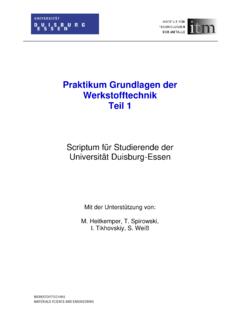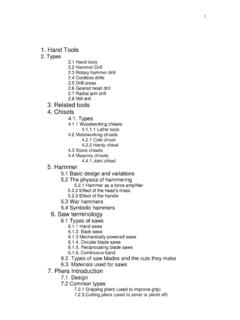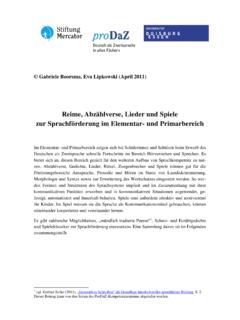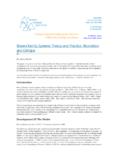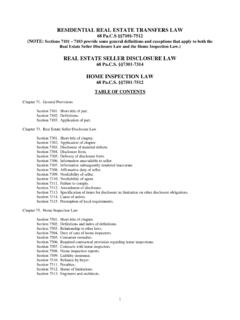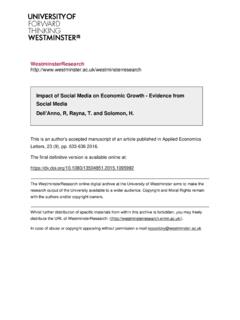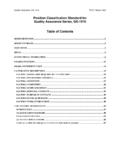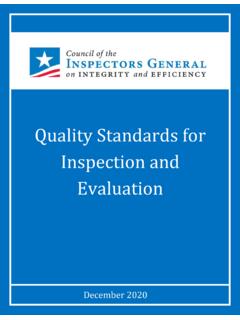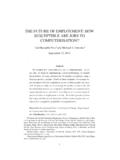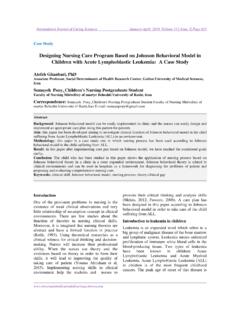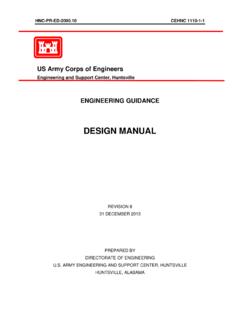Transcription of Language and society - uni-due.de
1 Language and society Methods in sociolinguistics The development of sociolinguistics Sociolinguistic data The linguistic variable The question of co-variation Indicators and markers Register and hypercorrection Sociolinguistics and Language change Social networks The Belfast investigations Types of speech communities Where do standards come from? Artificial languages Language and gender Growing into a gender role Gender roles in adulthood Gender and power Language used by women Gender and standard Gender-neutral Language Desexification of Language Gender and Language change Language and culture The ethnography of communication Colour terms Kinship terms Counting systems1 Language and societyLanguage is both a system of communication between individuals and a socialphenomenon.
2 The area of Language and society sociolinguistics is intendedto show how our use of Language is governed by such factors as class, gender,race, etc. A subsection of this area is anthropological linguistics which isconcerned with form and use of Language in different cultures and to what extentthe development of Language has been influenced by cultural environment. Raymond Hickey Language and society Page 2 of 37 The study of Language and society sociolinguistics can be dated to about themiddle of the twentieth century. Before that there were authors who commentedon how Language use was influenced or indeed guided by socially relevantfactors, such as class, profession, age or gender.
3 Indeed the father of modernlinguistics, Ferdinand de Saussure (1857-1913), saw Language as a type ofsocial behaviour and in this he reflected French sociological thinking of his day,above all that of his contemporary Emile Durkheim (1858-1917). But a set ofindependent, objective principles, in short a methodology for investigatingsocial factors in Language use, was not available until some decades after theadvent of Saussurean structuralism. In the early 1960s a number of linguists in America began to investigateEnglish usage in the United States from a social point of view.
4 Since then therehas been a flood of publications in this vein, primarily in America but soonafterwards in Europe as well (notably in Britain). Methods in sociolinguistics The roots of sociolinguistics are to be found in traditional dialectology. Thecommon denominator between the two disciplines is their concern with languagevariation, the one with that on a social level and the other with geographicallydetermined variation. However, many aspects of dialectological research areunacceptable to modern sociolinguists. The chief deficiency of dialect investigations in the nineteenth centuryand early twentieth century is that they were unrepresentative, theirinformants consisted of a skewed selection of speakers.
5 Older, male, rural,non-mobile speakers were given preference as informants. Because manydialectologists were trained as historical linguists they were frequentlyconcerned with discovering the most archaic forms of Language still spoken attheir time, often on the assumption that the older forms were somehow more genuine . The kinds of speakers just alluded to were regarded as those whowould speak the most conservative, hence most genuine form of a Language atany given time. This standpoint is quite different from that of present-daysociolinguistics. Language use in society applies to all groups, young and old,male and female, rural and urban.
6 Indeed because the majority of inhabitants ofwestern countries now live in cities and because such concentrations of peopletend to induce high amounts of Language variation, sociolinguists are more oftenthan not concerned with Language use in cities. In order to realise impartial investigations of Language in society it isnecessary to employ objective methods. Care must be take that the choice ofinformants be random and thus not subject to the possible bias of the fieldworker / linguist. Furthermore, consciously interviewing informants often has theRaymond Hickey Language and society Page 3 of 37disadvantage that the field worker has a standardising effect on informants useof Language (see below).
7 A dialogue situation in which informants are not awareof their status as informants is much more favourable and less likely to distortthe results. Various techniques have been developed here, for instance gettinginformants to talk about emotional matters generally draws their attention awayfrom their use of Language and hence furthers a more natural style, what linguistcall a vernacular of modern sociolinguistics 1) The prior definition of one s area of investigation 2) The impartial choice of informants 3) The use of preferred methods of investigation ( tape recordingrather than questionnaire, allowing for later control) 4)
8 Where possible, the anonymous collection of dataNew methods had to be evolved in order to get reliable data. It is impossible toinvestigate a whole community because of size and complexity. However, to geta representative description of what is typical of the speech of a city or region,all members of a community must have an equal chance of being selected for asurvey. Consequently, individuals are selected at random from the totalpopulation. Because dialectology was associated with the study of conservativeforms of Language , sociolinguists do not always use the term dialect.
9 The moreneutral term variety is often chosen because of the advantage that it does notimply contrast with a standard. The development of sociolinguistics The development of sociolinguistics is bound up with the activity of Americanand British linguists since the early 1960s. First and foremost of these isWilliam Labov who, in a pioneering investigation of the English of New Yorkcity published in 1966, arrived at many new conclusions concerning languagevariation and Language change. Labov stressed that 1) structural systems of the present and changes inlanguages of the past can be investigated in relation to each other, 2) languagechange can be observed in progress in present-day Language varieties and 3) thefact that so-called free variation was not in fact free at all but determined bydeliberate, if not conscious, choices by speakers.
10 Labov further stressed the need to collect data reliably. The linguist mustbe aware that informants will show the following features in their speech: 1)style shifting (during an interview), 2) varying degree of attention, somespeakers pay great attention to their own speech (so-called audiomonitoring );Raymond Hickey Language and society Page 4 of 37in casual speech the attention paid is less, 3) degree of formality, determined bythe nature of the interview, this can vary depending on the way informants reactto the interviewer and the situations they are placed in.



